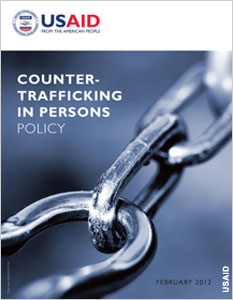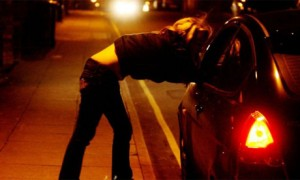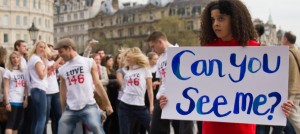The United States has a long history of helping developing nations around the world. USAID has been the forefront agency involved in extending U.S. assistance overseas from the time it was created in 1961 by President John F. Kennedy. Beginning in 2001, USAID has played a major role in U.S. efforts to eradicate modern day slavery. On February 23, 2012, we were honored to join other leaders in the anti-human trafficking field for the launch of USAID’s new Counter-Trafficking in Persons (C-TIP) initiative.
The Counter-Trafficking in Persons (C-TIP) initiative contains 5 objectives that incorporate the 4 P’s – Prevention, Protection, Persecution, and Partnership – in hopes of reducing human trafficking around the globe.
The five objectives can be broadly separated into two categories:
1. Education: compiling the knowledge of current anti-trafficking methods to improve future endeavors and training for USAID staff members
2. Assistance: integrating human trafficking efforts into already-established programs, and increase investment in high-risk regions
During the launch, Shared Hope was one of only two NGOs noted at the meeting and was commended for our domestic efforts, with special praise for our Rapid Assessments on Domestic Minor Sex Trafficking in Washington, Arizona and Virginia. We were honored to be recognized.
Speakers at the briefing emphasized the utilization of technology to help fight trafficking, as well as increased communication between and among governments, organizations, missions, etc. Technology has already proved its usefulness: two boys enslaved on a fishing boat in Asia saw the Human Trafficking hotline number on MTV, called, and were rescued. Technology and collaboration, coupled with the new C-TIP initiative may help in the decline of modern day slavery.
 Johns reported that they purchased sex because they were guaranteed submissiveness on the part of the prostituted woman or child. The distinct power imbalance and lack of relationship obligation was noted as a driving factor for those who purchase sex. Many of the johns reported having girlfriends or wives, and say they purchase sex to do the “dirty” sex acts that they would not do with their significant others because these acts could cause her to lose her self esteem. Though sex buyers recognize these distinctions, many commented that the sense of entitlement and degradation towards woman that develops from purchasing sex taints other relationships and their general attitude towards women.
Johns reported that they purchased sex because they were guaranteed submissiveness on the part of the prostituted woman or child. The distinct power imbalance and lack of relationship obligation was noted as a driving factor for those who purchase sex. Many of the johns reported having girlfriends or wives, and say they purchase sex to do the “dirty” sex acts that they would not do with their significant others because these acts could cause her to lose her self esteem. Though sex buyers recognize these distinctions, many commented that the sense of entitlement and degradation towards woman that develops from purchasing sex taints other relationships and their general attitude towards women. Flash Mob
Flash Mob The Village Voice has, for quite some time, run adult classified ads through
The Village Voice has, for quite some time, run adult classified ads through  However, how can attitudes truly be converted when services created to protect DMST victims carry names that are inherently accusatory? For example, in South Florida, the FBI task force, which responds to DMST victims, is called “Minor Vice Task Force.” Vice is an umbrella term for crimes involving actions considered by their very nature immoral. Thus, this title implies that the focus of this task force is minors engaging in “immoral” crimes, crimes they are forced to commit as trafficking victims. Other examples include the National Innocence Lost Task Force, which although represents a step in the right direction of viewing the trafficked minor as a victim, may be interpreted by those who are served by that force as having lost all their innocence, and still fails to maintain neutrality despite well meaning efforts. Although prostitution is legally a crime, the San Francisco Task Force on Prostitution and Vallejo Prostitution Task Force titles reinforce the idea that prostitutes are the real criminals, which perpetuates victim blaming, rather than revealing that purchasing young girls for sex as the true crime. It seems odd that the names of some human trafficking task forces would focus on the victim of the crime, considering that many other task forces, such as drug task forces, maintain a sense of neutrality about the purpose of the task force.
However, how can attitudes truly be converted when services created to protect DMST victims carry names that are inherently accusatory? For example, in South Florida, the FBI task force, which responds to DMST victims, is called “Minor Vice Task Force.” Vice is an umbrella term for crimes involving actions considered by their very nature immoral. Thus, this title implies that the focus of this task force is minors engaging in “immoral” crimes, crimes they are forced to commit as trafficking victims. Other examples include the National Innocence Lost Task Force, which although represents a step in the right direction of viewing the trafficked minor as a victim, may be interpreted by those who are served by that force as having lost all their innocence, and still fails to maintain neutrality despite well meaning efforts. Although prostitution is legally a crime, the San Francisco Task Force on Prostitution and Vallejo Prostitution Task Force titles reinforce the idea that prostitutes are the real criminals, which perpetuates victim blaming, rather than revealing that purchasing young girls for sex as the true crime. It seems odd that the names of some human trafficking task forces would focus on the victim of the crime, considering that many other task forces, such as drug task forces, maintain a sense of neutrality about the purpose of the task force.





